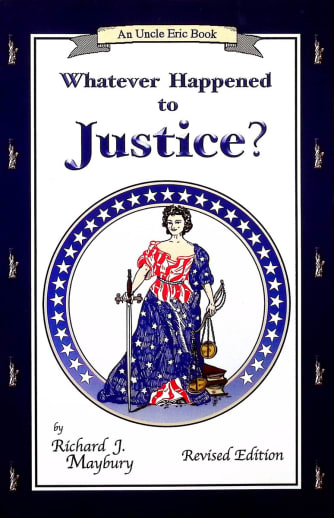Good question! Richard Maybury, author of Whatever Happened to Penny Candy, expresses in a lucid manner the workings of our legal system. Written as a series of letters to a nephew from Uncle Eric, topics include a discussion of the origins of government, principles on which our government is based, history of law, the difference between scientific law (how our government was intended) and political law (what we've ended up with), components of common law, reasons for government, and unsolved legal problems. This widely-endorsed book is also sprinkled with quotations from famous political teachers. An excellent introduction to law and justice! Revised edition. 256 pgs, pb.
Whatever Happened to Justice?
Description
Whatever Happened to Justice? by Richard J. Maybury explores America's legal heritage, and shows what's gone wrong with our legal system and economy and how to fix it.
Mr. Maybury discusses the difference between higher law and man-made law, and the connection between rational law and economic prosperity.
Whatever Happened to Justice? introduces the Two Laws that Mr. Maybury writes are necessary for a civilization to develop and advance:
1) Do all you have agreed to do, and
2) Do not encroach on other persons or their property.
Using the epistolary style of writing (using letters to tell a story), Mr. Maybury plays the part of an economist (Uncle Eric) writing a series of letters to his niece or nephew (Chris). Using stories and examples, Mr. Maybury gives interesting and clear explanations of topics that are generally thought to be too difficult for anyone but experts.
Mr. Maybury warns, "beware of anyone who tells you a topic is above you or better left to experts. Many people are twice as smart as they think they are, but they've been intimidated into believing some topics are above them. You can understand almost anything if it is explained well."
In the Uncle Eric book series, Richard Maybury, author of Whatever Happened to Penny Candy?, delves into the U.S. political and legal systems and the effects of events in the past. Taking the view that America’s founders were most concerned with establishing a government that ensured the greatest economic prosperity and the greatest liberty for individuals, the author explains the nature and structure of government.
In Justice, written as a series of letters, he discusses the origins of government, principles on which our government is based, history of law, scientific vs. political law, common law, reasons for government, and unsolved land more. Are You Liberal? Conservative? or Confused? guides readers through various political issues and the economic policies behind these philosophies. Ancient Rome compares events from the Roman Empire to happenings in our country today. World War I and World War II explore how thoughts and actions during each war influence the world we live in today.
The highly recommended and related Bluestocking Guides provide review questions along with answers.
| Product Format: | Softcover Book |
|---|---|
| Grades: | 7-AD |
| Brand: | Bluestocking Press |
| Author: | Richard J. Maybury |
| ISBN: | 9780942617467 |
| Length in Inches: | 8.5 |
| Width in Inches: | 5.5 |
| Height in Inches: | 0.625 |
| Weight in Pounds: | 0.8063 |
| Ages: | 12+ |
| Edited by: | Jane A. Williams |
| Edition: | Revised; Illustrated |
| Pages: | 255 |
| Publication Date: | 5/4/2013 |

